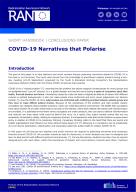Details
- Publication date
- 12 November 2020
- Author
- Directorate-General for Migration and Home Affairs
- RAN Publications Topic
- Social cohesion and polarisation
Description
The goal of this paper is to help teachers and youth workers discuss polarising narratives related to COVID-19 in the class or on the street. The input used comes from the knowledge of practitioner experts present during a twoday meeting (24-25 September) organised by the Youth & Education Working Groupfrom the Radicalisation Awareness Network (RAN) with the theme COVID-19 stories that polarise.
COVID-19 is a “wicked problem”, meaning that the problem has severe negative consequences for many groups and no straightforward “cure all” solution. It is a global disaster and has left many feeling a sense of uncertainty about their health, financial situation and future.
Uncertainty caused by crisis can lead to heightened distrust of others with different cultural or political backgrounds; it also can make people more conformist and one’s moral judgements can become harsher.
Due the COVID-19 crisis, policymakers are confronted with conflicting priorities between societal groups and they have to make difficult political choices. Because of the wickedness of the problem and high societal impact, youngsters can disagree about possible solutions, which can make discussions controversial.

